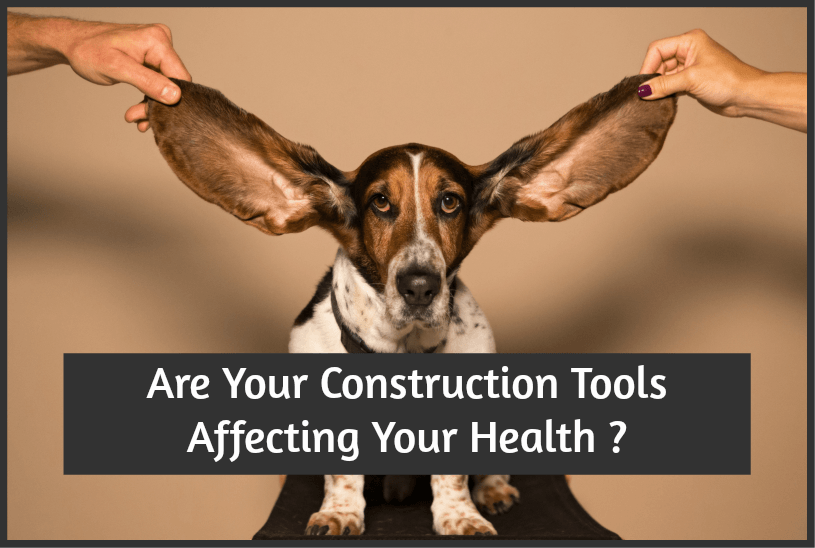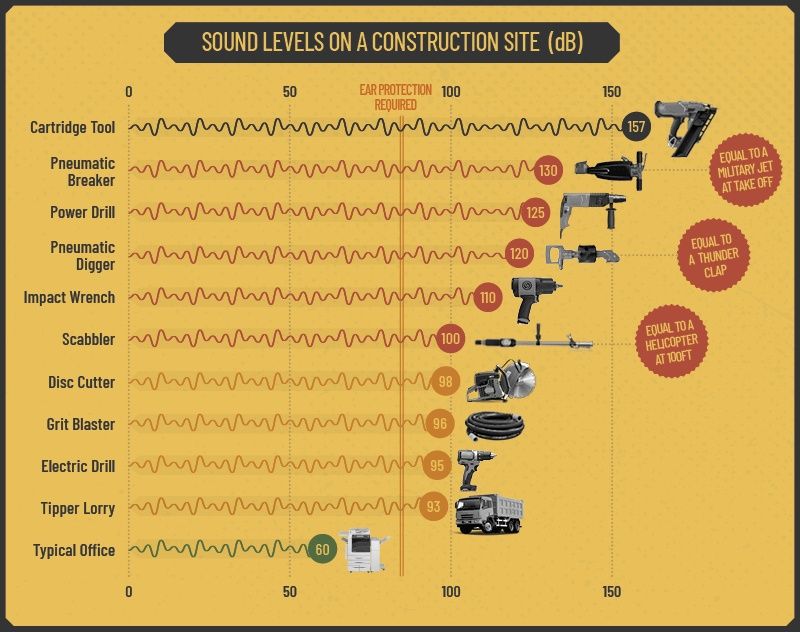
Are Your Construction Tools Affecting Your Health?
If you work in construction, you’re most likely aware that the industry is a noisy business. But did you know that the industry sector has the second-highest rate of people developing occupational deafness?
Unfortunately, once you lose your hearing, there’s no going back. It’s irreversible so preventing it from happening isn’t something that should be taken lightly.
That’s why Insulation Express have uncovered the loud truth of noise in construction. After uncovering the noise levels of the most common tools, they’ve discussed the ways in which these can affect your hearing – if you’re not using the necessary hearing guards. They’ve also uncovered the ways in which construction employers can protect their employees.
The Noise Levels of Construction Tools
As you may be aware, the volume of sound is measured in decibels (dB). Essentially, a higher decibel means a louder noise – and, therefore, more damaging.
So, to help raise awareness, Insulation Express have uncovered the decibels of the most common tools found on site (without hearing protection).
Did you know that being exposed to anything above 85dB for extended periods of time can permanently damage your hearing?
As you can see from the graphic, most of the construction tools are above this recommended limit.

For example, using a scabbler for 15 minutes is nearly as loud and just as damaging to our ears as a helicopter flying at 100ft.
Or using a pneumatic breaker (without protection) for one minute, is the noise equivalent of a military jet taking off.
Removing Your Hearing Guards for 5 Minutes Cuts Your Protection by in Half
Naturally, if you become familiarised with the noise level on a construction site, you may believe there’s no harm in removing your hearing protection.
However, that’s not the case at all.
If you were to use an electric drill (100 dB) whilst wearing hearing guards that give a protection of 25dB, your ears would only hear noise levels of 75dB.
If you then remove your hearing guards for five minutes, your protection reduces from 25dB protection to just 11dB.
This would expose you to a noise level of 89dB (100dB of the tool minus 11dB). That’s more than half of your protection gone!
A Real-Life Example: Hearing Loss in Construction
Bob Gowen a volunteer for Hearing Link and an electrician for over 35 years, believes that construction employees are “now [working] in noisier environments” than he did, yet “private contractors don’t supply ear protection for their staff.”
Gowen added that the main concern is that younger employees don’t seem to realise what the noise is doing to their hearing, so “getting them to wear protection is another problem.” Unfortunately, this means that “by the time they get into the 40 and 50 [age] bracket it is usually too late to save their hearing,” Gowen noted.
This is especially concerning considering that hearing loss can seriously impact your life.
Once Gowen started to suffer from hearing impairment, employees on construction sites often joked at his expense. “What I worry about is how other people with hearing loss who work in the construction industry cope. Unlike me, they may not be self-employed and therefore cannot simply walk away.”
How Employers Can Protect Their Workers
According to the World Health Organisation, 50% of all hearing issues can be prevented through various health measures.
So, how exactly should employers protect their workers hearing?
There are a number of ways employers can protect their employees from hearing damage, such as:
- Supply hearing protection.
- Purchasing quieter tools.
- Making machinery as quiet as possible by using pads to minimise vibration, using silent blades and nozzles, or replacing fans and motors.
- Looking out for alternative ways to carry out the construction work without the use of loud machinery – like doing tasks by hand.
- Limiting the amount of time workers are exposed to a noisy task.
Once you lose your hearing, sadly you cannot get it back, so it’s important to always wear hearing guards in noisy environments.
A good way to test your hearing is on your journey to work – play the radio at a volume just loud enough to hear.
On your way home play the radio again at the same volume, if you can’t hear it as well you may have damaged your hearing. If this happens, please visit your local doctor.
© New To HR


